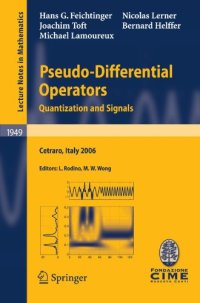
Ebook: Pseudo-differential operators: Quantization and signals
- Tags: Partial Differential Equations, Operator Theory, Approximations and Expansions, Fourier Analysis, Numerical Analysis, Quantum Physics
- Series: Lecture Notes in Mathematics 1949
- Year: 2008
- Publisher: Springer-Verlag Berlin Heidelberg
- Edition: 1
- Language: English
- pdf
Pseudo-differential operators were initiated by Kohn, Nirenberg and Hörmander in the sixties of the last century. Beside applications in the general theory of partial differential equations, they have their roots also in the study of quantization first envisaged by Hermann Weyl thirty years earlier. Thanks to the understanding of the connections of wavelets with other branches of mathematical analysis, quantum physics and engineering, such operators have been used under different names as mathematical models in signal analysis since the last decade of the last century.
The volume investigates the mathematics of quantization and signals in the context of pseudo-differential operators, Weyl transforms, Daubechies operators, Wick quantization and time-frequency localization operators. Applications to quantization, signal analysis and the modern theory of PDE are highlighted.
Pseudo-differential operators were initiated by Kohn, Nirenberg and Hörmander in the sixties of the last century. Beside applications in the general theory of partial differential equations, they have their roots also in the study of quantization first envisaged by Hermann Weyl thirty years earlier. Thanks to the understanding of the connections of wavelets with other branches of mathematical analysis, quantum physics and engineering, such operators have been used under different names as mathematical models in signal analysis since the last decade of the last century. The volume investigates the mathematics of quantization and signals in the context of pseudo-differential operators, Weyl transforms, Daubechies operators, Wick quantization and time-frequency localization operators. Applications to quantization, signal analysis and the modern theory of PDE are highlighted.